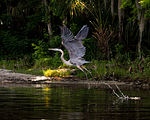DeBary Hall is a historic site in DeBary, Florida, United States. It is located at 198 Sunrise Boulevard. On July 24, 1972, it was added to the U.S. National Register of Historic Places. Frederick DeBary was a wine importer for Mumms Champagne and built DeBary Hall in 1871 as his hunting retreat along the St. John’s River in central Florida. The area offered various leisure activities such as swimming in the local springs, fishing, and hunting quail, deer, and alligator.
DeBary turned his leisure site into a profitable enterprise when he planted over 600 acres (2.4 km2) of citrus trees and began a steamboat company for trade up the St. John’s River to Jacksonville. The DeBarys used the hall as their family winter retreat until 1941, when the last American DeBary, Leonie deBary Lyon Brewster, died suddenly without an heir.
The area attracted many guests, and those that stayed at DeBary Hall required a personal invitation. Several additions and renovations were made to the house to accommodate the numerous guests. The additions included a second dining room, a wrap-around porch, two extra bathrooms, and three extra guest bedrooms. The Florida springs, hunting, and warm climate appealed to people across the nation and internationally. Guests to DeBary Hall may have included Presidents Grant and Cleveland, European Royalty, and General William Tecumseh Sherman.
The building was constructed during Reconstruction. It features several advanced attributes atypical of Southern homes during this meager time period. The 8,000 sq ft (740 m2) hunting lodge included an elevator for guests’ luggage, running water through a 500-gallon tank in the ceiling, wall-fed electricity made onsite by carbonate gas, a wired call system throughout the entire house, and a lightning protection system that covered the roof of this amazingly advanced home. The site also included a water tower and Florida’s first spring-fed swimming pool, which used a pump to fill and drain the pool each day. These unique features kept the residents self-sufficient at the mostly remote estate. The unique architectural features of the home serve as the main significance for the National Register of Historic Places designation.









